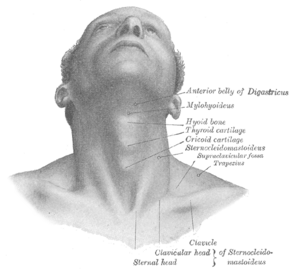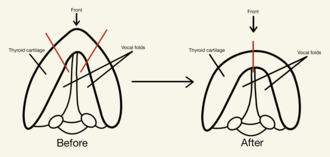Medicine:Adam's apple
| Adam’s apple | |
|---|---|
 Front view of the Adam's apple (laryngeal prominence) | |
| Details | |
| Precursor | fourth and sixth pharyngeal arches |
| Identifiers | |
| Latin | prominentia laryngea |
| Anatomical terminology | |
The Adam's apple is the protrusion in the neck formed by the angle of the thyroid cartilage surrounding the larynx, typically visible in men, less frequently in women. The prominence of the Adam's apple increases as a secondary male sex characteristic in puberty.[1]
Structure
The topographic structure which is externally visible and colloquially called the "Adam's apple" is caused by an anatomical structure of the thyroid cartilage called the laryngeal prominence or laryngeal protuberance protruding and forming a "bump" under the skin at the front of the throat. All human beings with a normal anatomy have a laryngeal protuberance of the thyroid cartilage. This prominence is typically larger and more externally noticeable in adult males. There are two reasons for this phenomenon. Firstly, the structural size of the thyroid cartilage in males tends to increase during puberty,[2] and the laryngeal protuberance becomes more anteriorly focused. Secondly, the larynx, which the thyroid cartilage partially envelops, increases in size in male subjects during adolescence, moving the thyroid cartilage and its laryngeal protuberance towards the front of the neck. The adolescent development of both the larynx and the thyroid cartilage in males occur as a result of hormonal changes, especially the normal increase in testosterone production in adolescent males. In females, the laryngeal protuberance sits on the upper edge of the thyroid cartilage, and the larynx tends to be smaller in size, and so the "bump" caused by protrusion of the laryngeal protuberance is much less visible or not discernible.[3] Even so, many women display an externally visible protrusion of the thyroid cartilage, an "Adam's apple", to varying degrees which are usually minor, and this should not normally be viewed as a medical disorder.
Function
The Adam's apple, in relation with the thyroid cartilage which forms it, helps protect the walls and the frontal part of the larynx, including the vocal cords (which are located directly behind it).[4]
Another function of the Adam's apple is related to the deepening of the voice. During adolescence, the thyroid cartilage grows together with the larynx. Consequently, the laryngeal prominence grows in size mainly in men. Together, a larger soundboard is made up in phonation apparatus and, as a result, men get a deeper voice note.[5][6]
Society and culture

While both men and women can possess an Adam's apple, the larger frequency of its appearance in men has led to the perception of the Adam's apple as an indicator of masculinity. As such, transgender women may choose to undergo cosmetic surgery to remove it from their necks, a process known as chondrolaryngoplasty, or colloquially as a "tracheal shave".[7] Transgender men may choose to augment and thereby enlarge the Adam's apple, a process known as masculinization.[8]
Chondrolaryngoplasty surgery is effective, and studies done by surgeons in Tel Aviv and Los Angeles have demonstrated complications to be few and, if present, transient.[9][10][7]
There is also an additional surgery available, feminization laryngoplasty, also known as “FemLar”, which can safely reduce the Adam’s Apple to an extent greater than that which can be accomplished by a tracheal shave, given it explicitly operates on the vocal cords within the Adam’s Apple as opposed to avoiding them. However, feminization laryngoplasty is a reconstructive surgery that carries additional risks and has a very strong feminizing effect on the voice that may or may not be desirable to the patient.[11][12][13] There are also far fewer practitioners who are known to be currently performing FemLar as it is far newer than the tracheal shave procedure.
Etymology
The English term "Adam's apple" is a calque of Latin pomum Adami, which is found in European medical texts from as early as 1600.[14] "Adam's Apple" is found in a 1662 English translation of Thomas Bartholin's 1651 work Anatomia.[15]
The 1662 citation includes an explanation for the origin of the phrase: a piece of forbidden fruit was supposedly embedded in the throat of Adam, who according to the Abrahamic religions was the first man:[15]
the common people have a belief, that by the judgment of God, a part of that fatal Apple, abode sticking in Adams Throat, and is so communicated to his posterity
This etymology is also proposed by Brewer's Dictionary of Phrase and Fable and the 1913 edition of Webster's Dictionary.[16] The story is not found in the Bible or other Judeo-Christian or Islamic writings.[17]
Linguist Alexander Gode proposed in 1968 that the Latin phrase pomum Adami (literally: 'Adam's apple') was a mistranslation of the Hebrew "tappuach ha adam meaning 'male bump'".[18] The confusion was supposedly due to the fact that in the Hebrew language the proper name "Adam" (אדם) literally means "man", and the word for "apple", "tapuach", is similar to the word "tafuach" which means "swollen", thus in combination: the swelling of a man.[19][20]
The medical term "prominentia laryngea" (laryngeal prominence) was introduced by the Basle Nomina Anatomica in 1895.[21]
In the American South, "goozle" is used colloquially to describe the Adam's apple, likely derived from guzzle.[22][23][24][25]
Additional images
See also
References
- ↑ Fitzpatrick, Thomas H.; Siccardi, Marco A. (2022), "Anatomy, Head and Neck, Adam's Apple", StatPearls (Treasure Island (FL): StatPearls Publishing), PMID 30570975, http://www.ncbi.nlm.nih.gov/books/NBK535354/, retrieved 2023-03-19
- ↑ "Prominentia laryngea". Medicine Online. http://www.medicineonline.com/dictionary/Prominentia-laryngea.html.
- ↑ "Laringe". Sisbib.unmsm.edu.pe. http://sisbib.unmsm.edu.pe/bibvirtual/libros/medicina/cirugia/tomo_v/laringe.htm.
- ↑ "Adam's Apple Reduction vs. Voice Feminization — Facialteam" (in en-US). 2022-04-27. https://facialteam.eu/blog/adams-apple-reduction-voice-feminization-surgery/.
- ↑ P. J. Bentley (1980), "Endocrine Pharmacology: Physiological Basis and Therapeutic Applications", CUP Archive, pág 240
- ↑ "Pubertad, nuestras diferencias". Esmas.com. http://www.esmas.com/salud/home/conocetucuerpo/365349.html.
- ↑ 7.0 7.1 "UCLA surgeons develop new technique to reduce Adam's apple without neck scar" (in en-US). https://newsroom.ucla.edu/releases/surgery-removes-adams-apple-without-scar.
- ↑ Deschamps-Braly, Jordan C.; Sacher, Caitlin L.; Fick, Jennifer; Ousterhout, Douglas K. (April 2017). "First Female-to-Male Facial Confirmation Surgery with Description of a New Procedure for Masculinization of the Thyroid Cartilage (Adam's Apple)". Plastic and Reconstructive Surgery 139 (4): 883e–887e. doi:10.1097/PRS.0000000000003185. ISSN 1529-4242. PMID 28350659. https://pubmed.ncbi.nlm.nih.gov/28350659/.
- ↑ "Chondrolaryngoplasty for appearance". Plast. Reconstr. Surg. 86 (3): 464–9; discussion 470. 1990. doi:10.1097/00006534-199009000-00012. PMID 2385664.
- ↑ "How a New Scarless Surgery Could Affect Transgender Patients" (in en). Time. https://time.com/5603828/transgender-scarless-adams-apple-surgery/. Retrieved 2023-01-02.
- ↑ Kim, Hyung-Tae (2020). "Vocal Feminization for Transgender Women: Current Strategies and Patient Perspectives". International Journal of General Medicine (NIH) 13: 43–52. doi:10.2147/IJGM.S205102. PMID 32104050.
- ↑ Thomas, James Philip (2022). "Feminization Laryngoplasty - A Comprehensive Approach to Reducing the Size of the Larynx and Pharynx". Otolaryngologic Clinics of North America (NIH) 55 (4): 739–748. doi:10.1016/j.otc.2022.05.002. PMID 35750518. https://pubmed.ncbi.nlm.nih.gov/35750518/. Retrieved 2 September 2023.
- ↑ Thomas, James Philip. "Feminization Laryngoplasty - Surgical Creation of a Feminine Voice". James Philip Thomas. https://www.voicedoctor.net/system/files/2022-11/FemLar%20handout%202022-11.pdf.
- ↑ du Laurens, André (1600). Historia Anatomica Humani Corporis. Paris. p. 510. https://archive.org/details/BIUSante_00276/page/n539/mode/2up. "Huius supreme pars βρόγχος, quibusdam vulgò morsus & pomum Adami appelatur."
- ↑ 15.0 15.1 Bartholin, Thomas (1662). Bartholinus Anatomy. London: Peter Cole. p. 123. https://archive.org/details/b30333696/page/122/mode/2up?. "That same bunch which is seen on the foreside of the Neck, is called Adams Apple, because the common people have a belief, that by the judgment of God, a part of that fatal Apple, abode sticking in Adams Throat, and is so communicated to his posterity"
- ↑ E. Cobham Brewer (1810–1897). Dictionary of Phrase and Fable. 1898. "Adam's Apple"
- ↑ George Crabb (1823), "Universal technological dictionary", Baldwin, Cradock, and Joy, "Pomum Ada'mi"
- ↑ Gode, Alexander (1968-10-28). "Just Words". JAMA 206 (5): 1058. doi:10.1001/jama.1968.03150050046009. https://jamanetwork.com/journals/jama/article-abstract/341605.
- ↑ William S. Haubrich (2003), "Medical Meanings: A Glossary of Word Origins", ACP Press, pág 5.
- ↑ "Adam's apple". Medicine.academic.ru. http://medicine.academic.ru/155/Adam's_apple.
- ↑ Axel Karenberg, Amor, Äskulap & Co.: klassische Mythologie in der Sprache der modernen Medizin, Schattauer, Stuttgart 2006, S. 128-129.
- ↑ Morris, Evan (November 2008). "Goozle « The Word Detective". http://www.word-detective.com/2008/11/goozle/. "If we follow 'goozle' back a bit further, we come to an interesting intersection with a far more common word, 'guzzle.'"
- ↑ Roy Blount Jr. (29 September 2009). Alphabet Juice: The Energies, Gists, and Spirits of Letters, Words, and Combinations Thereof; Their Roots, Bones, Innards, Piths, Pips, and Secret Parts, Tinctures, Tonics, and Essences; With Examples of Their Usage Foul and Savory. Farrar, Straus and Giroux. ISBN 978-1-4299-6042-7. https://books.google.com/books?id=xZWKctOqg8YC&pg=PT162. "The Dictionary of Smoky Mountain English defines google (or goozle) as 'the throat, Adam's apple.'"
- ↑ Roy Wilder (1 September 1998). You All Spoken Here. University of Georgia Press. p. 55. ISBN 978-0-8203-2029-8. https://books.google.com/books?id=xw8eLjzXH4IC&pg=PA55. "Adam's apple; goozle; the projection formed by the thyroid cartilage in the neck."
- ↑ "Goozle". Harvard College. https://www.daredictionary.com/view/dare/ID_00024696. "The throat as a whole, or spec the gullet, windpipe, or Adam’s apple. chiefly South, South Midland"
External links
- Lesson 11 at The Anatomy Lesson by Wesley Norman (Georgetown University)
 |






